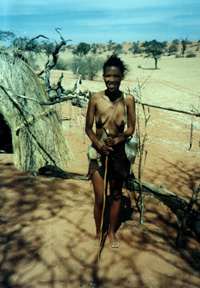
Photo. A nice Bushman woman in Namibia.
The Bushmen, also called the San, were the original inhabitants of Southern Africa and are known as Bushmen or San. Today they live in Botswana, Tanzania, South Africa, Namibia and Angola. The South African San are refugees from the Angolan and Namibian wars. Impact from the western society has caused big challenges for the Bushmen. It`s hard for them to adapt a new lifestyle and at the same time retain their traditional lifestyle. For them it`s a question how to survive.
A handful of Bushmen have resisted. The police have told them they will be killed, and are following them to prevent them hunting or gathering any food. Read more about the dramatic incident on: http://www.survival-international.org/news.php?id=1083
Bushmen is one of mankind's most ancient ethnic groups with a history stretching back 35,000 years. There are now believed to be about 100,000 Bushmen in the region, mainly in Botswana and Namibia.
I visited a clan from the Bushmen in Kalahary in Namibia. They seem to have retain much for their lifestyle and enjoyed their life, but not all of the Bushmen live their life so easy today. Reports from several sources indicates that both their lifestyle and life are seriously threathen.
It`s sad to hear about Bushmen who were forced to give up their lifestyle and moved into communities with alcoholism and social disorder. So many bad things happen to the Bushmen now. According to Mail&Guardian on 13 October this year (2005), Botswana's Foreign Minister Mompati Merafhe on Thursday denied claims by Britain's Survival International that it had launched an "ethnic cleansing" of San Bushmen from their ancestral land in the Kalahari. Read more about this by clicking on the link: http://www.mg.co.za/articlepage.aspx?area=/breaking_news/breaking_news__africa&articleid=253633
Some of the Bushmen have started a new life with stock (cattle and goats) instead of hunting. Schools have been set up where the children are taught in their own languages as well as in local languages.
The Bushmens` way of living have been hunting with bows and arrows, trapping small animals and eating edible roots and berries. They lived in rock shelters, in the open or in crude shelters of twigs and grass or animal skins.
They made no pottery, rather using ostrich eggshells or animal parts for storing and holding liquids. For these reasons, animals and nature are central features in the Bushmen's religious tradition, folklore, art and rituals.
They have been oppressed and dispossessed by both Bantu and European immigrant groups. The Bushmen were regarded as not just animals, but as vermin, and history even documents hunting of them for sport. This has resulted in that the total population of the Bushmen have dropped to 100 000 throughout southern Africa.
Organisations have been established to help them with the problems they are facing. This has to do with claiming their land rights, language preservation, job creation and education. It still hope for the Bushmen. By supporting the aid organisations, people around can help the Bushmen to survive.
Stein Morten Lund, 21 October 2005
Additional information
Should tribal peoples have a right to their lands? What do you think?
Hunting:
The Bushmen are expert archers. Although the bows are relatively small and thus, the range of an arrow tends to be below 25 metres. For this reason, the bushmen have to approach and shoot their quarry at very close range; a skill that requires the greatest patience and nimble feet. If an animal is hit by an arrow, it has no chance to escape, because the tips of the reed-shafted arrows are coated with a highly toxic poison, obtained from the larvae of a certain beetle.
The poison, which, even in tiny amounts is fatal to humans, is made using a recipe known only to the bushmen. Various plant ingredients are added in order to intensify the effect. As of yet, no one has found an antidote against the San's arrow poison.
Survival International: www.survival-international.org.
News.Telegraph:
http://www.telegraph.co.uk/news/main.jhtml?xml=/news/2002/07/04/wkung04.xml












